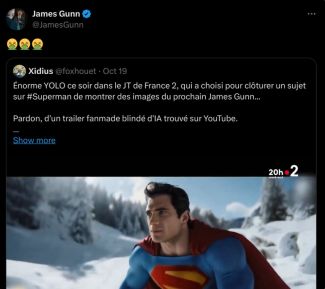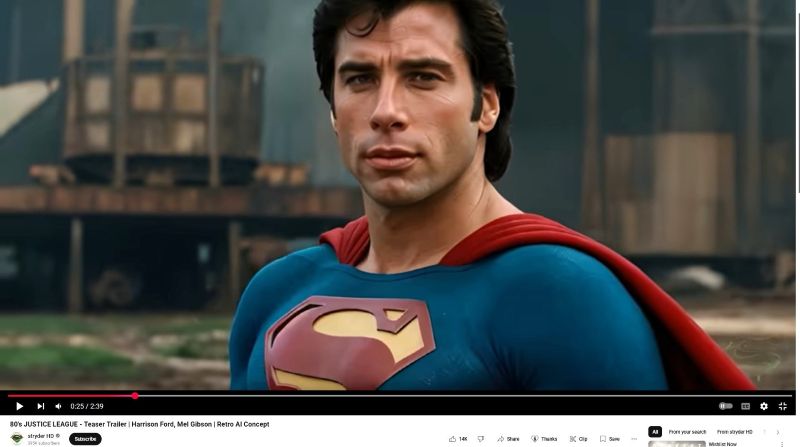Hollywood trade-news website Deadline.com blows the lid off the murky world of unauthorized, fan-made movie trailers. The trailers splice together bits from legitimate Hollywood content that is coupled with manufactured material, often created with artificial intelligence technology. (Pictured above is a screen grab of a fan-made trailer with John Travolta as Superman in a fanciful “Justice League” movie.)
“Instead of enforcing copyright on counterfeit commercials, Deadline can reveal that a handful of Hollywood studios are asking YouTube to ensure that the ad revenue made from views flows in their direction,” wrote Deadline’s Jake Kanter. “Quite why they are doing this is a mystery.”
After an initial expose on its website, Deadline reported YouTube removed two film trailers made by a prolific poster of unauthorized trailers known as Screen Culture.
The makers of unauthorized trailers (sometimes referred to as fake trailers in Hollywood) assert they don’t hurt anyone and their works enhance attention for the source mainstream films. One can think of them as “fan made,” but some come from professional-scale enterprises using YouTube and Instagram as ready-made platforms for distribution. The best of the unauthorized is beyond what a lone fanboy could craft.
The unauthorized content derived from copyright-protected sources have limited protections. U.S. federal law the Digital Millennium Copyright Act provides legal protection for YouTube and other internet services if posts on their platforms by others violate copyright. They are obligated to make timely take-downs to avoid legal sanctions. Take-downs can require a court order, however, not simply a complaint by a copyright holder such as a film studio. Cornering the producers is more difficult, especially since they are scattered around the world and not big companies.
Also, limited use of copyrighted content is permissible for parody and journalistic film reviews in the “fair use” loophole. This fair-use exception is fuzzy, and thus gives the unauthorized legal cover.
An aggressive player is Screen Culture, which is based near Mumbai, India, that created 23 versions of a trailer for “The Fantastic Four: First Steps,” for example. “Two of Screen Culture’s fake ‘Fantastic Four’ videos ranked higher than the official trailer, which had been posted by Marvel just days earlier,” says Deadline. Screen Culture has 1.4 million subscribers on YouTube, and recently launched a premium “membership” with three tiers.

Hollywood’s actors’ union is not on-board with a light touch by Hollywood movie studios. “We expect our bargaining partners to aggressively enforce their IP from any, and all, AI misappropriation,” says a SAG AFTRA spokesperson. IP is intellectual property. “Monetizing unauthorized, unwanted, and subpar uses of human centered IP is a race to the bottom.”
How real do the unauthorized look? Some are very slick.
“Even French national television was duped by a fake AI Superman trailer last year, showing clips of a besuited [Superman actor David] Corenswet months before any official footage had been released,” wrote Kantor in Deadline.com. “Director James Gunn made his feelings pretty clear, posting three puking emojis alongside the France Télévisions clip.” (See image at left.)
Elsewhere, an Australian YouTubber known as VJ4raw42 famously created a video suggesting sequel concept for 1997 blockbuster theatrical “Titanic.” The trailer-like video shows Leonardo DiCaprio’s Jack Dawson character found frozen in ice, who is revived for a sequel movie.
“‘Titanic 2: Jack’s Back’ got 53M views before VJ4rawr2’s original video was blocked by 20th Century Fox,” writes Deadline.com. The V-blogger has 393 million views overall.
“VJ4rawr2 has imagined a ‘Mission: Impossible’ sequel in which Tom Cruise runs from New York to LA,” writes Deadline, “While his most recent effort pictured Macaulay Culkin returning to his ‘Home Alone’ house to confront his family about childhood abandonment.”
The film trailer concept captures the imagination of the broad popular culture. Communicators in other sectors regularly create “trailers” for an assortment of goods and services, seeking some rub-off from Hollywood movie magic.

Leave a Reply